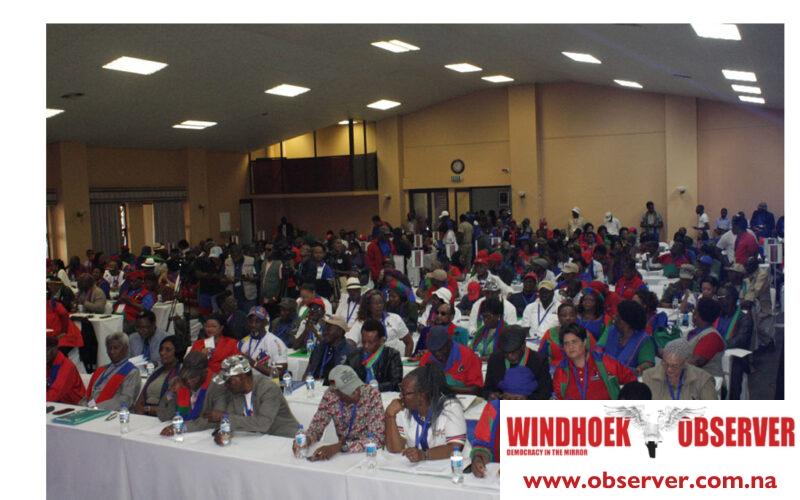Hertta-Maria Amutenja
Swapo’s decision to endorse Vice President Netumbo Nandi-Ndaitwah as the sole candidate for the party presidency while freezing the vice president position until 2027 has raised concerns about internal democracy and leadership succession.
Analysts argue that the move suggests a controlled leadership process rather than an open contest, questioning the party’s commitment to democratic principles.
Former Swapo Think Tank member and political commentator, Ben Mulongeni criticised the decision, saying it contradicts the principles of democracy.
“Endorsement is not a democratic thing. People know what the constitution says, and the rules state that there must be elections because positions are for everybody, not just certain individuals,” he said.
According to Swapo’s procedures, nominations for leadership positions should originate from various party structures, including regional bodies and the central committee.
During the congress, additional nominations can be made from the floor.
He cautioned against pre-selecting or endorsing a sole candidate, arguing that such actions could disenfranchise party members and contradict the party’s democratic values.
“Why do you have competition? A congress is a provision to elect new leaders. In the case of calling the congress to fill the vacant position, you still have to leave it open for aspirants and potential candidates,” he said.
No one within the party has made their aspiration for the position public, which Mulongeni says is a nonissue.
The endorsement of party presidents came at the time of former president Hifikepunye Pohamba, who endorsed late president Hage Geingob.
Late founding president Sam Nujoma recommended Pohamba as the party’s presidential candidate in 2004, and he was up against Hidipo Hamutenya and Nahas Angula.
This Mulongeni said it made party members believe that they could not go against their leaders.
“The position of the president was elected from the congress. It’s a property for the congress. It is a property of members. No one has the right to donate it. Positions are not donated. They are not handed over as a gift,” he said.
Mulongeni argued that Swapo is mixing revolutionary politics with democratic principles, choosing whichever approach suits its leadership at the time.
“During the revolution, we agreed to keep one vision, one tactic, and one strategy because we didn’t know the future. But in a democracy, people are free. They are free to think, free to move, and free to understand that leadership positions should not be reserved for only one or two people,” he said.
Mulongeni also pointed out that the decision could cause further divisions within the party.
While it may prevent factionalism in the short term, he said it risks alienating those who feel excluded or believe that their voices are not being heard.
“The party is setting itself up for more division because it looks like the chain is not for the benefit of the entire party. Those at the top want to secure their positions, and others are being blocked from contesting,” Mulongeni warned.
He also noted that freezing the vice-president position limits political competition within Swapo’s structures and prevents others from contesting for leadership.
“They are not assured of themselves, both the leader and those around the leader. They want to secure guaranteed positions for themselves. The party is bigger than that, and others who may challenge them should not be blocked by undemocratic processes,” he said.
Political analyst Ndumba Kamwanyah said the decision limits competition and could discourage internal debate and fresh leadership ideas.
“By freezing the vice-president position, Swapo is setting a precedent that may reduce political competition within the party. This reinforces a top-down approach rather than a participatory one,” he said.
Kamwanyah added that predetermined outcomes make it difficult for the party to claim democratic legitimacy.
“Swapo has internal processes, but when outcomes appear pre-decided, it raises doubts about whether diverse voices are genuinely considered,” he said.
He noted that while the endorsement may prevent factional fights in the short term, it could alienate members who feel excluded from leadership decisions.
The decision to leave the vice-president position vacant until the 2027 elective congress is viewed by analysts as a move to maintain the status quo.
The vice-president position is highly sought after, as it determines the party’s future presidential candidate when Nandi-Ndaitwah eventually vacates the presidency.
By freezing the position, Swapo essentially eliminates the possibility of a contested race, further consolidating power within a small group of individuals at the top of the party.
The Swapo central committee, during its meeting on Saturday, endorsed Nandi-Ndaitwah as the sole contender for the party presidency following the death of Hage Geingob in February 2024.
The party has since been without a president.
The party is hosting its extraordinary congress from 7 to 9 March.
Party sources revealed that the leadership has decided to leave the position vacant until the 2027 ordinary elective congress.
The decision was reportedly influenced by the fact that Article 16 of the Swapo constitution, which outlines the vice president’s role, does not specify a timeline for filling a vacancy in that position.
The Swapo constitution mandates that a vacant party presidency must be filled within 90 days, but it does not set a similar requirement for the vice president’s role.




